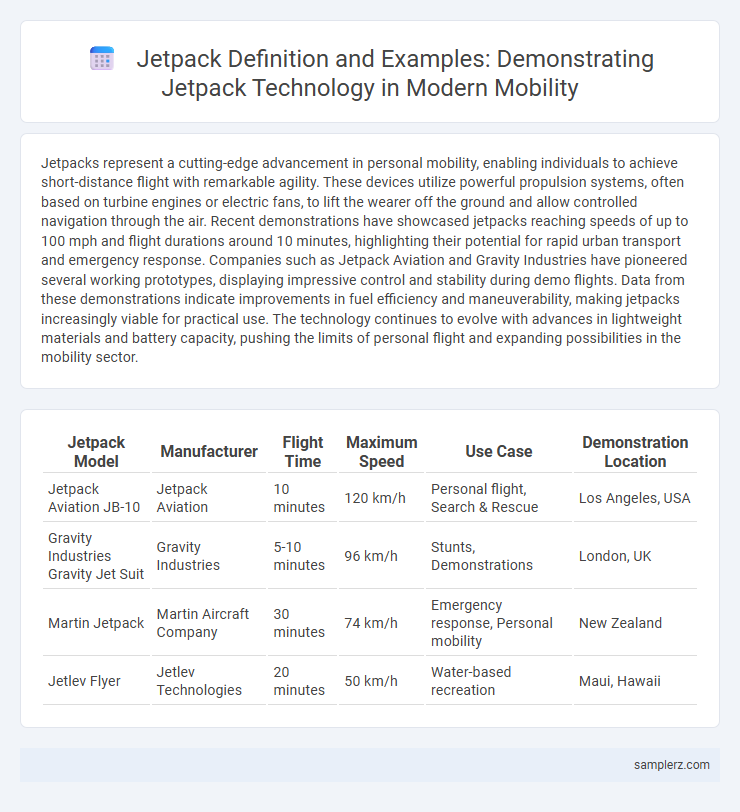Jetpacks represent a cutting-edge advancement in personal mobility, enabling individuals to achieve short-distance flight with remarkable agility. These devices utilize powerful propulsion systems, often based on turbine engines or electric fans, to lift the wearer off the ground and allow controlled navigation through the air. Recent demonstrations have showcased jetpacks reaching speeds of up to 100 mph and flight durations around 10 minutes, highlighting their potential for rapid urban transport and emergency response. Companies such as Jetpack Aviation and Gravity Industries have pioneered several working prototypes, displaying impressive control and stability during demo flights. Data from these demonstrations indicate improvements in fuel efficiency and maneuverability, making jetpacks increasingly viable for practical use. The technology continues to evolve with advances in lightweight materials and battery capacity, pushing the limits of personal flight and expanding possibilities in the mobility sector.
Table of Comparison
| Jetpack Model | Manufacturer | Flight Time | Maximum Speed | Use Case | Demonstration Location |
|---|---|---|---|---|---|
| Jetpack Aviation JB-10 | Jetpack Aviation | 10 minutes | 120 km/h | Personal flight, Search & Rescue | Los Angeles, USA |
| Gravity Industries Gravity Jet Suit | Gravity Industries | 5-10 minutes | 96 km/h | Stunts, Demonstrations | London, UK |
| Martin Jetpack | Martin Aircraft Company | 30 minutes | 74 km/h | Emergency response, Personal mobility | New Zealand |
| Jetlev Flyer | Jetlev Technologies | 20 minutes | 50 km/h | Water-based recreation | Maui, Hawaii |
Unveiling the Future: Jetpack Demonstrations in Urban Mobility
Jetpack demonstrations are revolutionizing urban mobility by showcasing personal flight technology that enables rapid, flexible travel over congested city streets. These prototypes utilize lightweight materials and advanced propulsion systems, offering a glimpse into a future where vertical takeoff and landing (VTOL) vehicles reduce commute times and traffic congestion. Key innovations include electric jet engines and enhanced safety features, positioning jetpacks as viable solutions for last-mile transportation.
Real-World Applications: Jetpack Use Cases Showcased
Jetpack demonstrations highlight real-world applications such as rapid emergency response, enabling first responders to access hard-to-reach locations swiftly. These use cases include search and rescue operations in rugged terrain where traditional vehicles cannot operate effectively. Moreover, jetpacks offer potential in urban mobility by reducing traffic congestion and providing a new dimension of personal transportation.
Breaking Barriers: Jetpack Flights at Public Events
Jetpack flights at public events showcase groundbreaking advances in personal mobility by breaking traditional barriers of transportation. Demonstrations highlight the potential for jetpacks to revolutionize urban commuting and emergency response through vertical takeoff and landing capabilities. These events capture public imagination while proving the feasibility of compact, human-powered flight technology.
Safety Protocols in Jetpack Demonstrations
Jetpack demonstrations strictly follow advanced safety protocols, including the use of protective gear such as helmets, fire-resistant suits, and secure harnesses to minimize injury risks. Operators undergo rigorous training and flight simulations to ensure precise control and emergency response readiness. Safety zones are established to keep spectators at a safe distance, and continuous monitoring of weather conditions is conducted to prevent accidents during flight tests.
Innovations in Jetpack Technology Highlighted On-Stage
Innovations in jetpack technology showcased on-stage include enhanced propulsion systems offering increased fuel efficiency and improved flight stability through advanced gyroscopic controls. Demonstrations featured lightweight carbon-fiber materials reducing weight while boosting durability, enabling extended flight times up to 10 minutes. Cutting-edge safety mechanisms such as automated emergency parachutes and real-time telemetry monitoring systems were integral to these breakthroughs, emphasizing practical urban mobility applications.
User Experience: Firsthand Accounts from Jetpack Demos
Jetpack demos provide immersive user experiences by allowing participants to feel the sensation of personal flight, offering a unique blend of thrill and intuitive control. Early users highlight the seamless responsiveness and lightweight design, which enhance maneuverability and reduce fatigue during flight. Feedback emphasizes the potential for jetpacks to revolutionize urban mobility with fast, flexible, and engaging transportation solutions.
Jetpacks and Emergency Response: Live Demonstration Insights
Jetpacks showcase rapid response capabilities by enabling first responders to reach inaccessible areas during emergencies, drastically reducing arrival times. In live demonstrations, jetpacks have been used to simulate rescue missions, highlighting their potential in urban search and rescue operations and disaster zones. These advancements emphasize jetpacks' role in enhancing emergency response efficiency through aerial mobility innovation.
Environmental Impact Observed During Jetpack Showcases
Jetpack demonstrations reveal notable environmental impacts, including increased noise pollution and localized emissions from fuel combustion. These showcases often highlight challenges in reducing carbon footprints compared to electric mobility solutions. Observations emphasize the need for advancing sustainable propulsion technologies to minimize ecological disruption in personal aerial transportation.
Crowd Reactions to Jetpack Mobility Demonstrations
Spectators at jetpack mobility demonstrations often express awe and excitement, captivated by the futuristic technology's ability to achieve vertical takeoff and maneuverability. Enthusiastic crowd reactions include spontaneous applause, cheering, and heightened engagement, reflecting widespread fascination with personal flight innovations. These demonstrations generate significant social media buzz, amplifying public interest in advanced mobility solutions.
Lessons Learned: Best Practices from Jetpack Demo Events
Jetpack demo events reveal critical lessons in mobility innovation, emphasizing thorough safety protocols and real-time pilot training to enhance operational reliability. Effective crowd control measures and interactive engagement foster public trust and interest, crucial for future urban air mobility adoption. Data from these demos highlight the importance of iterative design feedback loops to improve device stability and user experience.

example of jetpack in demonstration Infographic
 samplerz.com
samplerz.com